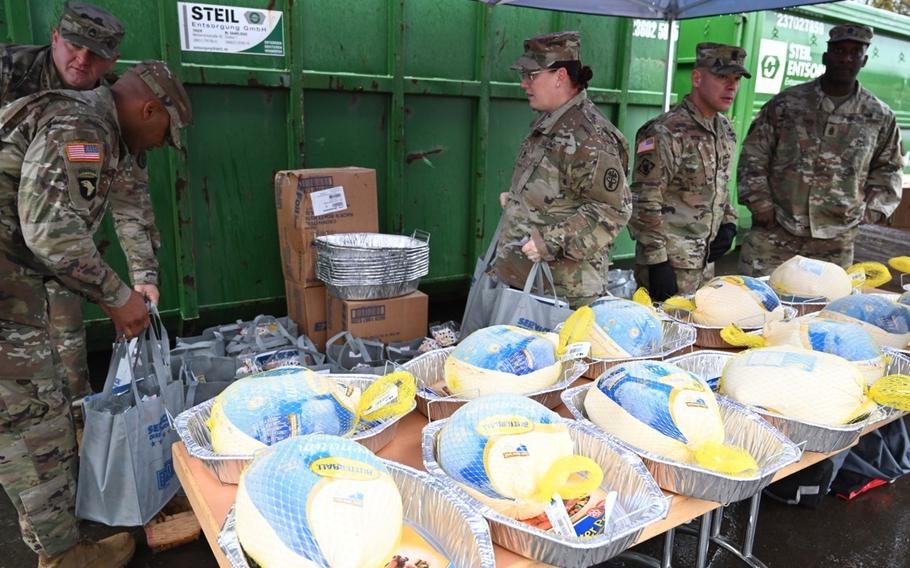
Noncommissioned officers in Kaiserslautern, Germany, prepare Thanksgiving meals in November 2022 intended for junior enlisted service members. (Nicole Alberico/U.S. Army)
WASHINGTON — Senate lawmakers will not support an effort by the House to give junior enlisted service members a nearly 20% pay raise, proposing a 5.5% pay hike instead.
The Senate Armed Services Committee’s personnel subpanel said Wednesday that it will recommend a 1% pay bump for troops ranked E-3 and below in addition to a 4.5% pay increase for all service members.
The House is pushing for a 15% pay boost for troops in ranks E-4 and below, for an overall 19.5% pay increase for the military’s youngest enlisted service members. E-5s with less than 10 years of service would also see a pay bump of about 7% under the plan.
The contrasting proposals are part of the House and Senate versions of the National Defense Authorization Act, annual legislation that sets policies for the Pentagon.
The House began debating its version of the authorization bill Wednesday, and the Senate Armed Services Committee is expected to release its draft of the legislation this week.
The pay increase proposed by the House earned a rebuke Tuesday from the White House, which said it “strongly” opposed significantly altering pay before the completion of a quadrennial review of military compensation next year.
The White House warned the House proposal would “lead to pay compression in some parts of the enlisted military basic pay table.” It also cited the steep cost of the targeted pay raises: $3.3 billion in fiscal 2025 and more than $21.9 billion from 2025 to 2029.
Sen. Elizabeth Warren, D-Mass., said Wednesday that lawmakers were significantly hamstrung by a debt-ceiling deal from last year that imposed limits on defense and non-defense spending. The caps particularly cut into pay increases for civilian employees of the Defense Department who will see a 2% pay raise, she said.
House lawmakers said their 15% pay raise proposal was based on research conducted by a quality-of-life panel convened by the House Armed Services Committee in collaboration with the Defense Department.
The panel said junior service members needed a sizable pay increase to keep up with a rising cost of living that can strain the budgets of troops making as little as $24,000 in basic pay. Rep. Mike Rogers of Alabama, the Republican chairman of the committee, sharply criticized the White House for rejecting the proposal.
“President Biden believes providing the men and women who serve in our armed forces with adequate compensation is too costly. This is offensive and wrong,” he said in a statement. “Too many military families are relying on food banks, [the Supplemental Nutrition Assistance Program], and the [Special Supplemental Nutrition Program for Women, Infants, and Children] in order to put food on the table. Republicans and Democrats on our committee agreed this is unacceptable.”
Lawmakers will spend the summer negotiating a final version of the authorization bill. A final vote on the legislation typically takes place before the end of the year.